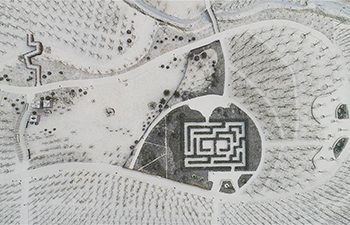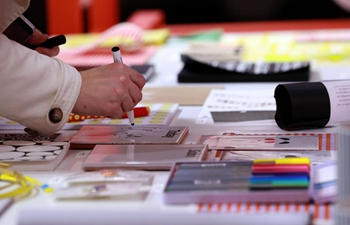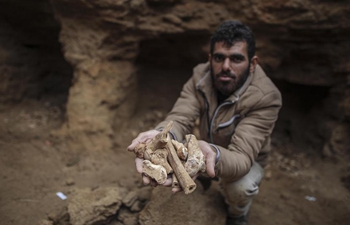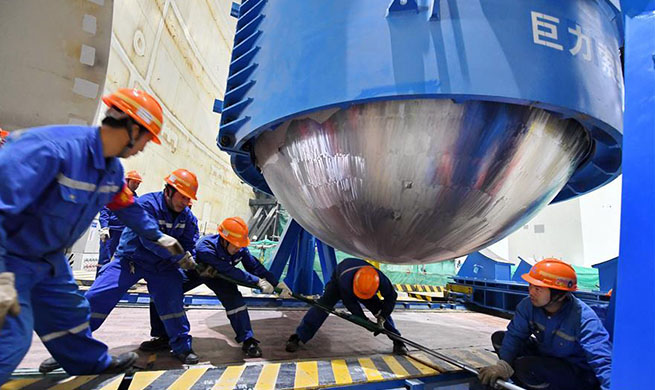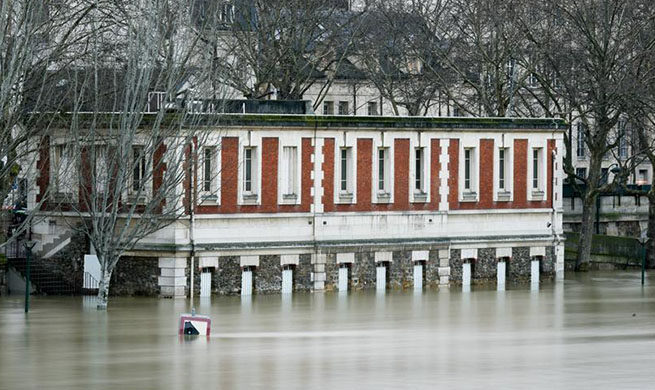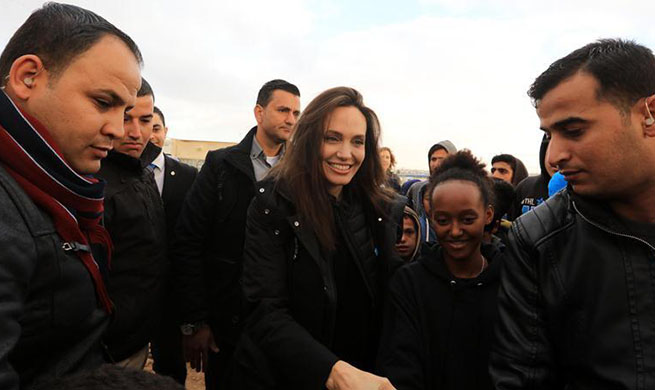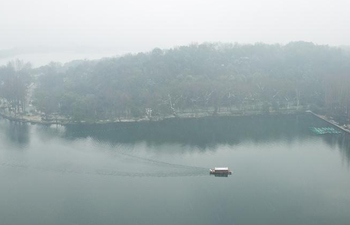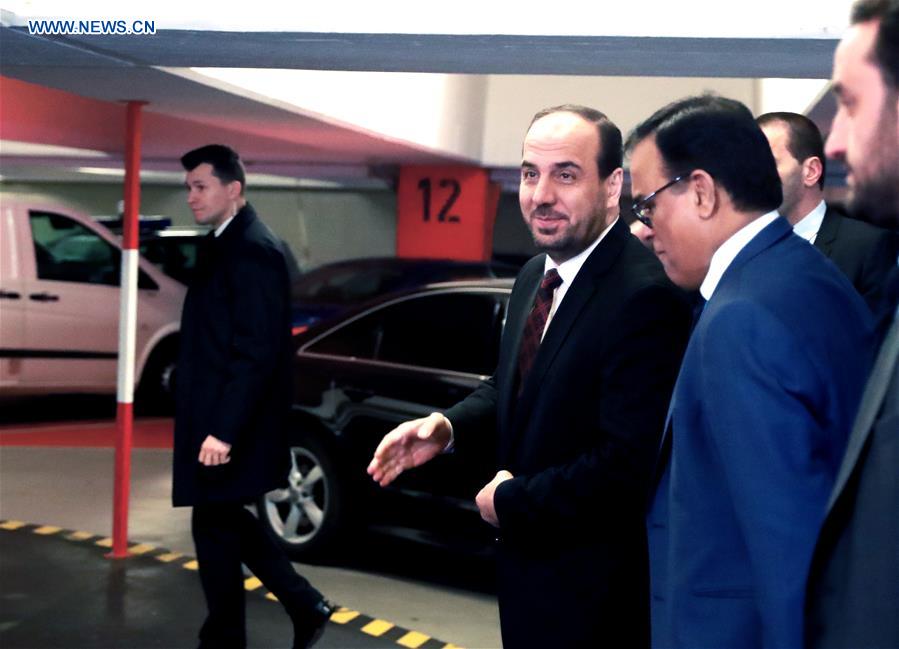
Nasr al-Hariri (2nd L), head of the Syrian opposition delegation, arrives for Syrian peace talks in Vienna, Austria, on Jan. 25, 2018. Syrian peace talks organized by the United Nations (UN) resumed here on Thursday, days before Russia-sponsored peace talks scheduled to take place in Russia's Sochi. (Xinhua/Pan Xu)
by Hummam Sheikh Ali
DAMASCUS, Jan. 28 (Xinhua) -- Just days ahead of the Russian-backed Syrian talks in Sochi, the U.S. camp attempted to derail the Russian efforts to find a solution to Syria's long-standing conflict by shaking the ground ahead of the Russian-supported talks.
Russia has for some time been preparing for the Syrian talks in Sochi slated for 29-30 of this month, inviting 1,600 people to the Russian Black Sea resort of Sochi for the Congress of National Dialogue aimed at resolving the years-long crisis in the Arab country.
Last December, Russia, Iran, and Turkey agreed to hold the congress in Sochi. At the time, the Syrian government was quick to accept to take part in the congress, which is expected to tackle issues such as the constitution and elections in Syria.
Ahead of Sochi, the UN special envoy to Syria, Staffan de Mistura, called for a meeting in Vienna for the opposition and government sides to discuss constitutional issues.
On Jan. 18, De Mistura's deputy Ramzi Ezzedine Ramzi said during a visit to Damascus that the Syrian government had agreed to take part in the planned Syrian talks in Vienna, Austria.
Ramzi hoped for a positive engagement in the Vienna talks, linking the success of the Vienna talks with the success of the Sochi talks in Russia.
At the time, observers in Damascus expressed worries about the sudden timing of Vienna talks just a couple of days ahead of Sochi, questioning the intentions of the Western backers of the Vienna meeting.
Sure enough, the delegations of the Syrian government and the opposition attended the Vienna talks mediated by De Mistura on Thursday and Friday, agreeing to nothing in that meeting but an alleged cease-fire in the rebel-held Eastern Ghouta countryside of Damascus that was supposed to go into effect at midnight Saturday.
Several Arab media outlets have reported the cease-fire agreement, citing opposition figures. However, Damascus remained tight-lipped about the reports and activists reported shelling on Saturday and a wide-scale rebel offensive on Sunday against a key military base in Harasta city.
Moreover, the chief negotiator of the government delegation, Bashar al-Jaafari, said following the talks that his delegation has rejected a document presented by the group of five: the United States, France, Saudi Arabia, Jordan, and the United Kingdom.
The document was said to violate the Syrian people's right to self-determination and contradicts the UN Security Council resolution 2254.
According to media leaks, the document determines in advance the future of Syria as a state when it comes to the nature of the parliament and the powers of the president.
In response, Jaafari said that Damascus would not accept the paper as it undermines the Geneva process and Syrian National Dialogue Congress in Sochi.
In remarks to reporters, Jaafari said the document presented by the Western countries and some of their Arab allies contradicts international resolutions and aims to undermine the Geneva talks and the Sochi Congress.
Jaafari said that it is no coincidence that the Vienna meeting coincided with the "leaking" or intentional distribution of an "informal paper" for the so-called revival of the political process in Geneva about Syria by representatives of five countries, "all of whom have been involved in shedding Syrian blood since the beginning of the crisis."
He went on to say that "this failed attempt" seeks to undermine the Geneva talks, the Sochi Congress, and any prospects for the political solution in Syria because this is consistent with its authors' destructive policy in the region.
Osama Danura, a Syrian political expert, told Xinhua that the American side wanted to precede the Sochi congress by reshuffling the political and military cards to negatively impact the outcome of the Sochi congress.
The U.S. and its Western allies, as well as their Arab friends, have put forward the "informal document" that has a negative impact, because, on the legal part, it violates the international law in allowing the people to decide their political future and also undermines the sovereignty of the country.
"They wanted to apply their vision of the future of Syria and how the country will be ruled according to their own vision," Danura said, adding that such a vision encroaches upon the Syrian people's rights of determining the future of their country.
Danura also spoke about the timing of presenting this document in the Vienna talks, saying that "the sudden and out-of-context timing of the Vienna talks ahead of Sochi insinuates the American desire to hinder Sochi and reshuffle the political cards."
Danura said that the Vienna talks aimed at focusing only on the constitution and elections, while ignoring the counter-terror part, as large swathes of Syria are still controlled by various rebel groups, the strongest of which are linked to al-Qaida, which don't support elections or a civil state and it's impossible to hold elections in such large parts of the country.
So the U.S. wanted to hinder the Russian efforts that aim to "Syrianize" the solution for the Syrian crisis by engaging the Syrians in finding a solution and minimizing the influence of the regional and international players in the conflict, Danura said.
He added that such attempt by the U.S. to derail the Sochi congress was reflected when the Saudi-backed Syria's main opposition group, Syrian Negotiations Commission (SNC), said it would boycott the Sochi peace talks.
"The SNC has decided not to participate in Sochi after marathon negotiations with the UN and representatives of countries involved in Syria," the group said.
Danura said the document presented in Vienna and the boycott of the opposition could affect the outcome of the Sochi talks.
In parallel with the Vienna talks and the Western attempts to pull the rug from underneath the Russians, the U.S. and France have stirred the Syrian chemical weapons file, by renewing accusations of Russia and Syria for the use of chemical weapons in the Syrian conflict.
The Syrian Foreign Ministry said France and other Western powers are aiming to derail the upcoming Sochi talks by re-stirring the issue of Syrian chemical weapons.
On Tuesday, France announced it was sanctioning 25 people and companies over their alleged links to Syria's chemical weapons program, a day after activists claimed the Syrian forces used chlorine in an attack on the rebel-held Eastern Ghouta countryside of Damascus, causing 21 to suffer from breathing difficulties.
Meanwhile, U.S. Secretary of State Rex Tillerson charged that the Syrian government may still be using chemical weapons in its attacks, saying Russia, Syria's government key ally, bears the ultimate responsibility.
"Russia ultimately bears responsibility for the victims in Eastern Ghouta and countless other Syrians targeted with chemical weapons since Russia became involved in Syria," said Tillerson.
On Tuesday, France and the U.S., as well as 22 other countries, agreed on an initiative to work more closely to target those behind chemical weapons attacks and impose necessary sanctions.
Last November, Russia vetoed a U.S.-written resolution at the UN Security Council, which was designed to extend the international investigation into the use of chemical weapons in Syria.
The U.S. accused the Syrian government of using chemical weapons in an attack on the rebel-held town of Khan Sheikhun in April of 2017 that allegedly killed 90 people.
The Syrian government, however, categorically denied the accusations, saying the rebels in Khan Sheikhun staged the attacks.
On Wednesday, the Russian Foreign Ministry said in a statement that Washington is trying to derail the objective investigation into the chemical attacks as it is not interested in identifying those who are truly responsible for the attacks.
France and the U.S. aim to complicate the Sochi talks, and this will completely halt the dialogue process in Syria since it doesn't suit the U.S. interest, the statement noted.
Also on Wednesday, the Syrian Foreign Ministry responded in a statement that the French and U.S. accusations are "part of the methodical policy against Syria."
Mahmoud Meri, the secretary-general of the oppositional Syrian Democratic Front, told Xinhua that all of the recent U.S. schemes were aimed at faltering the Sochi talks, noting however that even though the conference is threatened, but it could be the beginning of the solution for the Syrian crisis as it includes a broad representation of the oppositions that believe in the need to find a solution.
As for the Saudi and U.S.-backed opposition, Meri said they reflect the policies of their backers and their presence in the conference will not derail the talks given the broad representations in Sochi.
He added that the Western powers want to dictate the solution according to their vision, as envisioned by the informal document they put forward during the Vienna talks, while the Russians, who invited 1,600 people to Sochi aims to have the Syrians themselves decide their future and reach a solution to their crisis far from foreign interventions and pressures.




